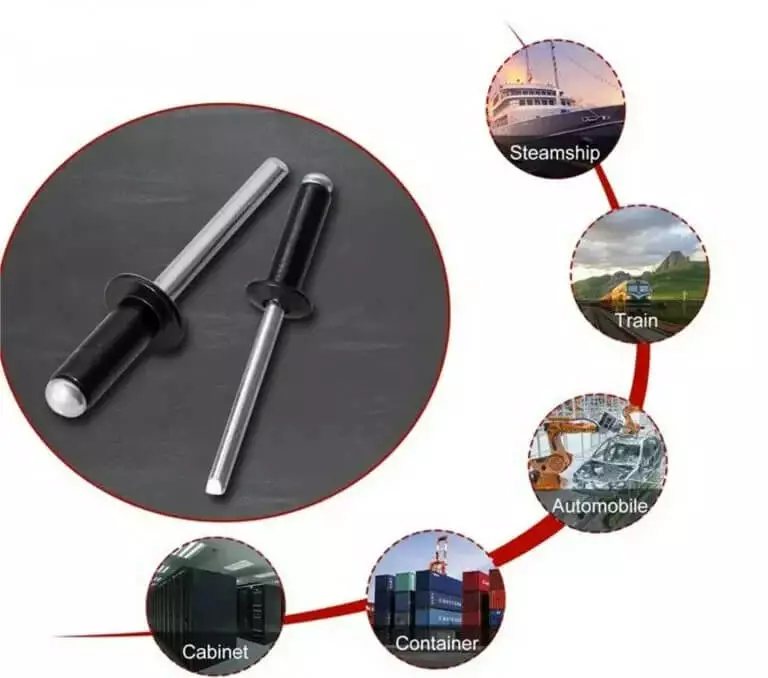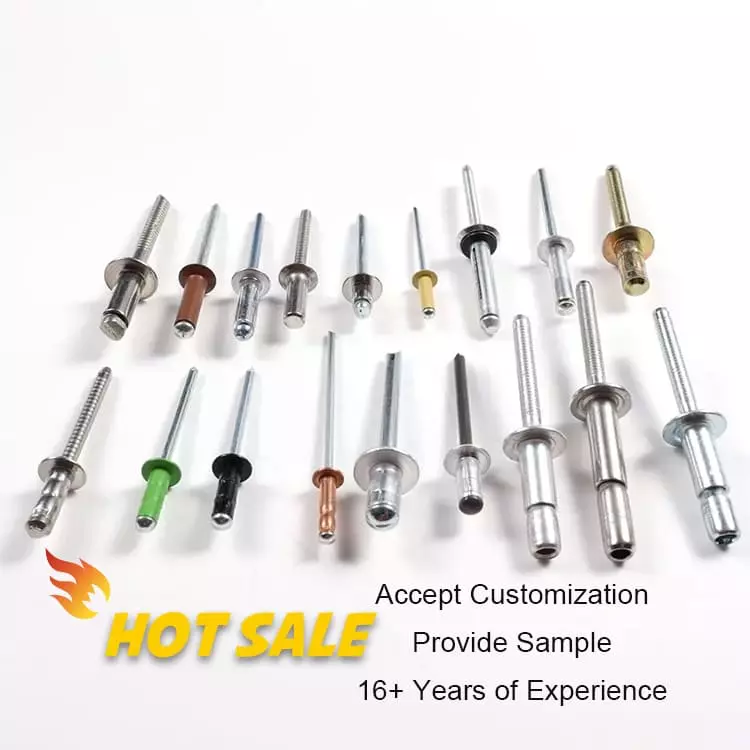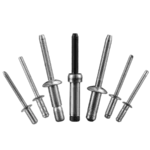Are Rivets Stronger Than Bolts ? How to Choose Rivets or Bolts ?
Table of Contents
Are rivets stronger than bolts ?Not sure how to choose the right fasteners for your project? This blog can solve your problem. I show you the benefits and applications of rivets and bolts. You can quickly solve your confusion with this article.
What is a Rivet ?

Blind rivets, also known as pop rivets, are a kind of rivets suitable for single-sided riveting. Its high reliability, connection strength, long life, easy to operate and use, can be used for aluminum alloy, structural steel and composite materials connection.
Blind Rivet consists of two parts, which are rivet body and nail core. In the production process, the rivet body is usually produced using wire cold heading, plate stamping or tube processing.
Blind rivets are suitable for use where the joint can only be riveted from one side. The rivet is placed into a pre-drilled hole and the core is pulled with a special riveting tool to deform and expand the rivet body to realize the fixing.
What is a Bolt ?
Bolt is a common fastener used to join two or more parts. It usually consists of a rod-like body with external threads, a head, and a nut.
The body of the bolt has external threads for securing the bolt to a part. The head of the bolt typically has a hexagonal shape to allow it to be turned using a wrench or wrench. A nut is a part with internal threads that is used to secure a bolt to another part by threading it to match the bolt’s external threads.
A bolt is used by threading the body of the bolt through the hole of the part to be joined, and then screwing the nut onto the body of the bolt so that the two parts are tightly joined together. By tightening the nut, the bolt creates a pre-pressure that makes the connection stronger and more stable. Bolts can also be disassembled and reused, giving them greater flexibility and convenience.
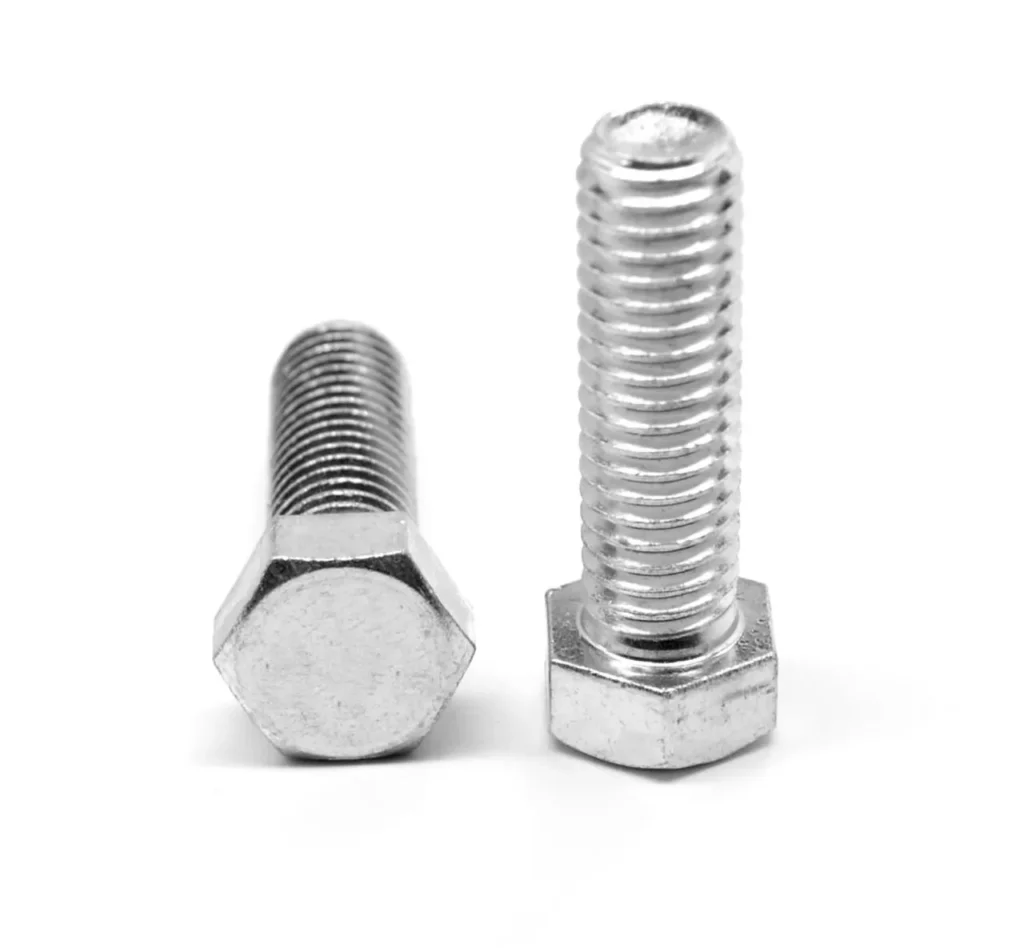
Are Rivets Stronger Than Bolts ?
| Rivets | Bolts | |
|---|---|---|
| Threading | No threading required | Requires threading of connected parts |
| Strength and Stability | Provides high strength, permanent connection | Higher strength and stability |
| Suitable for thin plates | For thin plate connections and thin materials | Suitable for a wide range of materials |
| Tools | Specialized installation Tools | Brick marking can be done with a hand-held tool |
| Installation | Quick installation, no thread rotation required | Requires threaded swivel mounting for slower speeds |
| Disassembly and Reuse | Not easy to disassemble, need to cut the pins short to unattach. Cannot be reused. | Installation can be accomplished using standard tools and is reusable |
| Usage Scenarios | Unilateral mounting. Both sides mounted. | Installation on both sides only |
Rivet vs Bolt Strength Analysis
- Shear Strength:
Rivets perform exceptionally well in double-shear structures, with uniform force distribution and effective load dispersion. Particularly, structural rivets, with shear strength reaching 10–12 kN (for a diameter of 6.4mm), are often used in high-vibration areas such as bridges and vehicle frames. In contrast, bolts rely on the frictional force of the threads to transfer shear force, and their structural stability is slightly inferior. - Tensile Strength:
Bolts have a distinct advantage in tensile loads. Their axial preload effectively prevents joint opening, making them suitable for heavy-duty and disassemblable structures. Rivets, lacking the thread preload, are not suitable for high tensile force applications. - Vibration and Fatigue Resistance
Riveted connections without threaded notches have smaller stress concentrations and better fatigue resistance. In contrast, bolts tend to loosen under vibrating conditions and require additional anti-loosening measures (such as thread locking agents or spring washers). - Serviceability & Durability
Rivets are permanent connections and almost maintenance-free. Bolts, on the other hand, can be repeatedly disassembled and assembled, which is convenient for inspection and replacement, but it also means that the connection may weaken due to frequent disassembly and assembly.
Rivet vs Bolt Material Comparison

In the field of engineering fastening, the material and manufacturing process directly determine the strength, durability and applicable environment of fasteners. Rivets and bolts of the same material have significant differences in mechanical properties and corrosion resistance. Therefore, correct material selection is crucial for structural safety.
① Comparison of Material Composition
- Rivets are typically made of:
- Aluminum Alloy: Lightweight and corrosion-resistant, suitable for automotive and aviation lightweight structures.
- Carbon / Alloy Steel: High strength, commonly used in bridges and mechanical equipment.
- Stainless Steel 304 / 316: Resistant to salt spray and fatigue, ideal for outdoor or high-humidity environments.
- Monel / Nickel Alloy: Extremely corrosion-resistant, used in marine and aviation structures.
- Bolts are often made of:
- High-strength Alloy Steel (Grade 8.8 / 10.9 / 12.9): Possessing excellent tensile strength.
- Carbon Steel: An economical option, widely used in building and mechanical connections.
- Stainless Steel: Suitable for assemblies requiring long-term corrosion resistance.
② Differences in Processing and Connection Principles
- Rivet connection achieves permanent fastening by means of “plastic deformation locking”. When cold or hot riveting, the rivet expands in the hole and fills the gap, forming a tight bond. This connection method has no stress concentration points at the threads and has excellent fatigue resistance.
- Bolt connection achieves clamping through “pre-tightening force + friction”. The pre-tightening torque provides an initial pressure, but the threads can cause stress concentration and loosening risks. Therefore, in high-vibration environments, anti-loosening washers or thread locking compound are usually required.
③ Rivmate Technical Data
Rivmate test data shows:
- The shear strength of the standard 6.4mm structural blind rivet can reach 12.5 kN, which is approximately 80% of the strength of an M8 high-strength bolt.
- The weight of an aluminum alloy rivet is only one-third that of a steel bolt of the same size, offering a significant advantage in lightweight assembly.
Industrial Applications: Where Rivets and Bolts Excel
Rivets and bolts play different roles in various industrial fields. The choice of which fastening method to use depends on load characteristics, maintenance requirements and environmental conditions. Research by Rivmate shows that rivets excel in permanent connections and lightweight structures, while bolts have more advantages in maintainable and high-preload structures.
Aerospace
In aircraft manufacturing, rivets play an absolute leading role. The structures used in aviation are mostly made of aluminum alloys and titanium alloys. Welding may cause thermal deformation, while rivets can form high-strength connections at room temperature.
- Advantages: Lightweight, high vibration resistance, and long fatigue life.
- Representative Applications: Aircraft fuselage skin, wing frame, and cabin panels.
Aerospace rivets (such as those made of Monel and titanium alloys) can maintain stable structural performance throughout a service life of over 25 years.
Automotive Manufacturing
Rivets and bolts are used in parallel in the lightweighting of vehicle bodies and the assembly of electric vehicles.
- Rivets Predominant: Suitable for aluminum alloy body, doors, and battery pack structures, facilitating automated installation.
- Bolts Predominant: Applied to chassis, suspension, and powertrain systems, facilitating maintenance and replacement.
The Rivmate Structural Blind Rivet has a shear strength of 11kN at the vehicle body connection points and can replace spot welding structures.
Construction & Infrastructure
Large structures such as bridges and steel trusses often use high-strength bolts (Grade 10.9/12.9), which are easy to disassemble for maintenance and inspection.
- Rivet Application: In the early days of steel bridges, hot riveting was commonly used. Nowadays, it is only employed in certain structural repairs or decorative connections.
- Bolt Application: High pre-tension and friction-type connections ensure structural stability. If maintenance-free and better vibration resistance are pursued, Rivmate Structural Rivet can be considered as an alternative solution.
Rivet vs Bolt: Advantages and Disadvantages
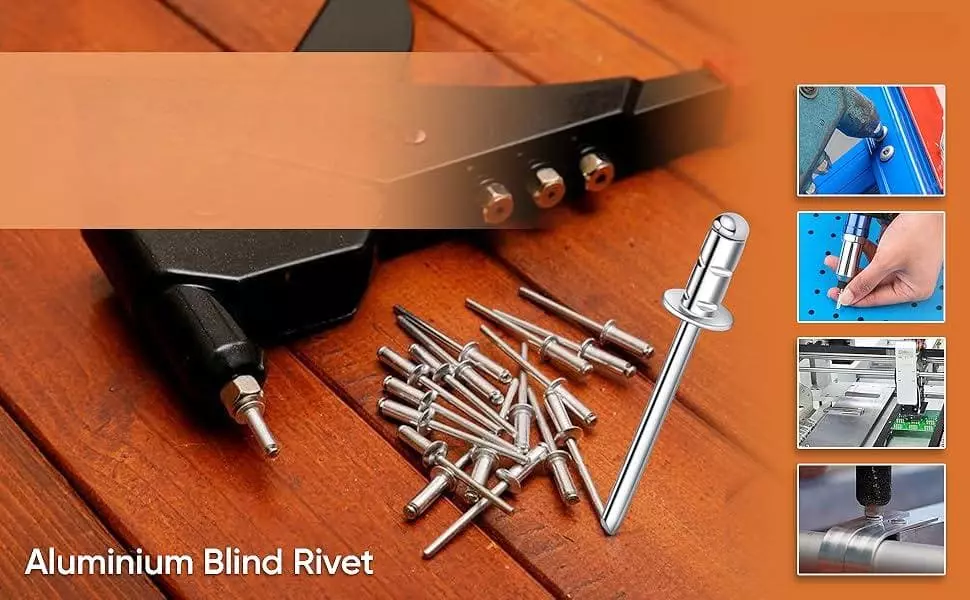
In the field of structural fastening, rivets and bolts each have their own advantages. The choice of which method to use should be determined based on factors such as load type, vibration conditions, maintenance cycle, and structural accessibility. The following is a professional comparison summarized by Rivmate:
- Excellent vibration resistance: The riveted structure forms a tight bond through plastic deformation, unlike bolts which may loosen due to vibration.
- Permanent connection: Suitable for structures that cannot or do not need to be disassembled later, such as aircraft skins, bridge nodes, vehicle frames, etc.
- Good fatigue resistance: The stress is evenly distributed, especially in the double shear structure, effectively reducing local stress concentration.
- Lightweight advantage: The weight of aluminum alloy and stainless steel rivets is only 30%–50% of that of the same specification bolts, which is particularly important in automobiles and aviation.
- It cannot be disassembled. If repair is needed, it must be drilled apart.
- The installation process is complex and requires special riveting equipment and molds.
- Pre-tightening force cannot be applied and it is not suitable for high-tension structures.
Advantages of Bolts
- Removable and Reusable: Facilitates maintenance, replacement and regular inspection.
- High Tensile Strength: The pre-tightened threads can effectively withstand axial loads, suitable for heavy-duty applications such as bridges, machinery and construction.
- Easy Installation: High degree of standardization, universal specifications worldwide, facilitating replacement and on-site operations.
Disadvantages of Bolts
- Prone to Loosening: Requires anti-loosening measures (such as locking washers, thread sealants) in a long-term vibrating environment.
- Significant Stress Concentration: The root of the thread is a typical fatigue source point, which is prone to cause crack propagation.
- Heavier Weight: The overall structure weighs approximately 20% – 30% more than the riveted solution.
Rivmate Engineering Insights: Choosing the Right Fastening System

In industrial assembly and structural design, choosing the right fastening system determines the reliability of the structure, maintenance cycle and cost control. Rivmate, as a professional fastening technology supplier, based on thousands of engineering verifications, has summarized the following suggestions:
If the structure is subjected to long-term loads and high-vibration environments
It is recommended to use the Rivmate Structural Rivet Series. These rivets feature a locking core design, enabling permanent mechanical locking even under extreme conditions.
- Application Scenarios: Automotive body frames, wind turbine towers, rail vehicles, bridge joints.
- Technical Characteristics: Shear strength ≥ 12kN, vibration loosening resistance performance is 30% better than high-strength bolts.
If the connection needs to be frequently disassembled and assembled or requires pre-tightening control
Choose Rivmate Bolt Fastening Solutions (bolt fastening system). Rivmate’s high-strength locking bolt system offers precise torque control and reusability, making it suitable for maintainable structures.
- Application scenarios: Construction machinery, heavy-duty equipment, and building steel structures.
- Technical features: Adjustable preload force, tensile strength up to 10.9/12.9 grade standards.
- Additional options: Optional coating anti-corrosion treatment and torque locking technology to extend service life.
Rivmate's systematic fastening solution
Rivmate offers a full range of fasteners from aviation-grade high-strength rivets to industrial lock bolt systems, along with hydraulic, electric and automated installation tools to achieve efficient and safe assembly. Rivmate Technology Commitment: Each product is certified by ISO 9001 / IATF 16949 and verified by ASTM / ISO / DIN standard mechanical performance tests.
FAQ
Q1: Are rivets stronger than bolts in shear?
Yes, in most double-shear structures, rivets typically exhibit superior shear strength compared to bolts. This is because rivets achieve full-contact locking through plastic deformation, enabling uniform stress distribution, whereas bolts primarily rely on friction and localised clamping forces to bear loads. For instance, the Rivmate 6.4mm structural rivet achieves a shear strength of 12.5 kN, equivalent to 80% of an M8 high-strength bolt.
Q2: Can rivets replace bolts in structural applications?
In certain instances, yes. For permanent, vibration-resistant, or difficult-to-maintain structures—such as those in aviation, automotive bodies, or bridge joints—rivets are the superior choice. However, for connections requiring periodic maintenance or disassembly, bolts remain more suitable. Rivmate recommends employing rivets in static loads and high-vibration environments, while utilising bolts in maintainable structures. Combining both achieves optimal performance.
Q3: Why are airplanes riveted instead of bolted?
Aerospace structures demand lightweight construction and fatigue resistance. Rivets are lightweight, require no threaded structures, and do not induce stress concentrations or fatigue crack propagation. Furthermore, rivets form reliable connections between dissimilar materials—such as aluminium alloys and titanium alloys—without thermal influence. Consequently, over 90% of aircraft skins and frames utilise riveting techniques.
Q4: Which is better for vibration — rivet or bolt?
Rivets are demonstrably superior to bolts. Bolts may loosen or experience a reduction in preload under prolonged vibration, whereas the mechanical locking properties of rivets ensure a permanently secure fastening. This is the primary reason rivets are extensively employed in railway rolling stock, automotive chassis, and wind turbine structures.
Yes. Once installed, rivets form a permanent, non-removable connection. Should maintenance or replacement be required, disassembly must be achieved through drilling or mechanical cutting. Consequently, Rivmate engineers recommend evaluating future maintenance requirements during the design phase to determine whether to employ riveting or a detachable fastening method.
Discover Rivmate Structural Rivet & Bolt Solutions

In the field of structural fastening, Rivets are not always superior to Bolts. However, they do perform better in terms of shear resistance, vibration resistance and fatigue resistance. In contrast, bolts still have the advantage in scenarios that require high tensile loads, ease of maintenance and repeatable assembly. Therefore, the best solution needs to be reasonably selected and combined based on working conditions, load forms and usage cycles.
Contact us immediately to learn about Rivmate’s high-strength structural rivets and fastening solutions. Obtain the technical data sheet, selection recommendations and performance test report. Make each fastening operation achieve a perfect balance of structural reliability, manufacturing accuracy and operational safety.
Reference

How to Rivet Metal to Wood?
How to Rivet Metal to Woo

What Is Riveting in Metal Work?
What Is Riveting in Metal
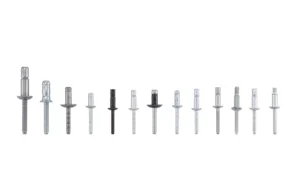
What Metal Are Rivets Made Of
What Metal Are Rivets Mad
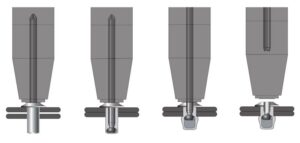
How to Rivet Metal to Metal
How to Rivet Metal to Met

